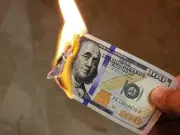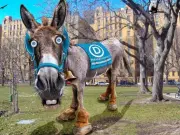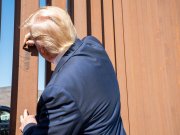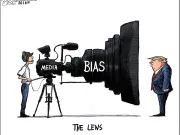The Chinese government has issued vague but stern-sounding warnings it will retaliate for a bill passed by Congress that would require the White House to protect human rights and ensure the territory’s autonomy. But China’s options for economic retaliation are limited. And most of these options have already been exercised amid President Donald Trump’s trade war.
China’s most obvious method of retaliation would be to stop buying American goods. But China has already imposed tariffs on $135 billion worth of products. Sales to China from all over the U.S. have plunged.
The agricultural industry has been hit especially hard. Farm bankruptcies are up 24% this year, and a report by the American Farm Bureau Federation finds that almost 40% of farmers’ income this year will come either from insurance payouts or government bailouts.
This is an economic catastrophe for many farmers and a headache for many other exporters. But the damage has already been done. Few expect exports to China to recover even if the trade war ends tomorrow because China has found other suppliers. Even those U.S. exporters who are still selling their goods in China must realize their situation is shaky; if they are wise, they are already looking for alternative markets.
So, China has little left to threaten on the trade front.
The other big weapon in the Chinese arsenal is investment. The Chinese government is traditionally a major buyer of U.S. government debt, and it holds the second-biggest stash of Treasuries (after Japan). Over the years, many have fretted that a spat between the U.S. and China would lead the latter to sell off that mountain of debt, creating a world of hurt for the U.S. financial system and economy.
But this danger is vastly exaggerated for two reasons. First, as recent experience demonstrates, the U.S. simply does not need Chinese government cash. In 2015 and 2016 China experienced one of the biggest capital flights in history, with about $1 trillion pouring out of the country. This resulted in a huge drawdown of China’s foreign-exchange reserves, most of which are U.S. bonds.
If the U.S. were heavily dependent on Chinese government financing, interest rates on U.S. debt – and by extension, throughout the U.S. economy – should have risen. Instead, they fell.
If China can dump a quarter of its U.S. bond holdings and not cause a noticeable movement in American borrowing costs, then the threat represented by the remaining three-quarters probably is small. The U.S., like the rest of the developed world, is simply awash in financial capital.
Unloading its reserve stockpile in retaliation for U.S. actions toward Hong Kong would put China in greater danger than the U.S. Without the cushion of reserves, a repeat of 2015-16 could lead to a classic emerging-market crisis in China, with capital outflows forcing a sudden currency depreciation, devastating the financial system and bringing the economy to a sudden stop.
One final thing China could do is restrict its exports of rare earths, a crucial input for many technology products. China now dominates production of these commodities. But as my colleague David Fickling has noted, this threat also is minimal; when China cut off rare-earth exports to Japan in 2010 as part of a geopolitical dispute, Japan simply teamed up with an Australian company to find new supplies, quickly breaking China’s monopoly. The U.S. could easily replicate this feat.
So, China has few economic weapons left with which to threaten the U.S. over Hong Kong.
It will likewise be powerless to retaliate over other geopolitical and humanitarian disputes, such as U.S. condemnation of the mass internment of Muslims in China’s Xinjiang province or territorial spats in the South China Sea. For that matter, China’s continued ability to escalate the trade war seems limited.
But China does have other weapons at its disposal: the kind that explode. In pushing China over everything from trade to human rights to Hong Kong’s autonomy, the U.S. should remember its own history. It was relentless U.S. economic and diplomatic pressure over Japan’s invasion of China that pushed that country into launching a surprise attack on Pearl Harbor in 1941. With its economic arsenal depleted, China could at some point decide that a harder form of retaliation is in order. Escalating U.S.-China tensions thus make the world a more dangerous place.
This column does not necessarily reflect the opinion of the editorial board or Bloomberg LP and its owners.
via newsmax








My thoughts go out to the people of Hong Kong. They made a decision and they are showing how to fight for it.
Regarding the China Trade deal, I look to President Trump to do his best with this. Our farmers really need some help after Obama’s “historical” help, lol
https://www.agri-pulse.com/articles/3613-obama-signs-historic-five-year-farm-bill-into-law
“Stabenow has said the law is “really 12 different pieces of legislation from farm to research to fruits and vegetables to energy across the board all put together in something we call the farm bill.” Stabenow said the law seeks to significantly increase support for fruits and vegetables and local food systems. It authorizes large investments in land and water conservation. ”
Gee energy? Like the energy company in Ukraine? And twelve different pieces of legislation that they will call a farm bill? Wonder how many of the 12 actually got passed?
Large investment in land and water conservation? I like to know where.
” Barbre said the law eliminates direct payments while maintaining decoupled farm support programs that will minimize the possibility of planting and production distortions that could trigger new World Trade Organization challenges. ”
NWO rules. NOT America First rules. No wonder the farmers are in trouble.
GOD BLESS PRESIDENT TRUMP! GOD BLESS THE USA!